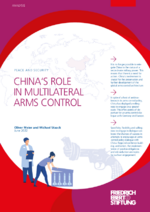Germany and China in Multilateral Arms Control
by Stefan Pantekoek
Disarmament and arms control are central building blocks of the global security architecture and require trust between states. Trust that is steadily dwindling in many regions of the world and is making the multilateral arms control architecture fragile. Russia's war against Ukraine complicates the prospects of success for arms control. At the same time, challenges to international arms control and regulatory policy, such as the conflicts in Iran and North Korea, show that they cannot be effectively addressed without China's constructive involvement.
In order to better understand China's role in multilateral arms control, the Friedrich-Ebert-Stiftung (FES) published a study entitled "China's Role in Multilateral Arms Control" back in 2022. The study provides important background information on the principles of Chinese arms control policy and possible options for an arms control policy dialogue with China.
The new FES brief analysis builds on the study and outlines the goals and formats of a possible dialogue between Germany and China in order to reduce threats to humanity and strengthen regional and global stability through (international) cooperation. The two authors, Dr Oliver Meier and Prof. Michael Staack, show in which areas there are similarities in arms control policy and point out that in some areas there is a lack of clarity about the actual degree of congruence between German and Chinese arms control policy. Different perceptions of their roles, historical experiences, regional contexts and geopolitical objectives mean that Germany's and China's arms control policy goals may appear similar at first glance, but may in fact diverge. Accordingly, the authors examine in detail on the obstacles to an arms control dialogue with China.
On the basis of their analysis, Dr Oliver Meier and Prof. Michael Staack then present a series of possible approaches to dialogue. Among other things, they argue in favour of bottom-up approaches at expert level. For example, discussions on technical issues could be a good starting point, as Chinese participants generally need a political mandate to participate. Furthermore, such dialogues should be long-term and aim to build trust between the participants. As a first step, an arms control policy dialogue with China could serve to explore concrete possibilities for Sino-German cooperation. As an example, the authors cite the possible involvement of Chinese expertise in the debate on the verification of nuclear disarmament within the framework of the International Partnership for Nuclear Disarmament Verification (IPNDV), from which China withdrew in 2017. Other examples include biosecurity and humanitarian arms control.
About the authors
Oliver Meier is a Senior Researcher at the Institute for Peace Research and Security Policy at the University of Hamburg (IFSH). Prior to this, he was Deputy Head of the International Security Division of the German Institute for International and Security Affairs (SWP) in Berlin.
Michael Staack is Professor of Theory and Empiricism of International Relations at Helmut Schmidt University/University of the Federal Armed Forces in Hamburg.
This report is part of a FES publication series, which examines Beijing’s strategy in a range of different global policy fields. The overarching theme of the series is the future of multilateralism in light of China’s rise to world power and the growing competition over the establishment of values and norms. It seeks to address questions such as: How can we go about initiating a constructive process of political negotiation between Europe and China on the regulatory framework for global governance? In which areas is there potential for more coordination and cooperation with China? And, in contrast, where should Europe be taking countermeasures and conducting its own groundwork, for example to ensure that newly industrialised and developing countries see it as a reliable partner?
Meier, Oliver; Staack, Michael
Deutschland und China in der multilateralen Rüstungskontrolle
Bonn, 2024
Download (PDF) (190 KB, PDF-File)

